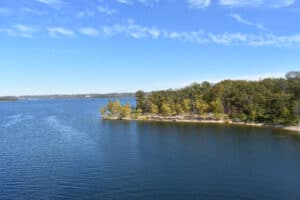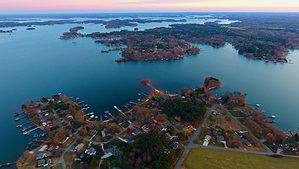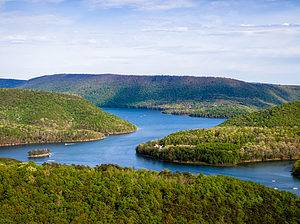The Great Lakes are some of the most majestic and sweeping features of North America. Together, they dominate the ecosystem around them, even influencing weather patterns and storms. There are five lakes that mostly share borders with the United States and Canada. Today, we are going to learn which of these lakes is the deepest, plus compare them to the other large lakes of the world. Let’s get started!
What are the Great Lakes?

The Great Lakes are the largest chain of freshwater lakes in North America.
©Michael J. Eves/Shutterstock.com
The Great Lakes are a series of large freshwater lakes located in the northern regions of the United States, sharing a border with Canada. They are Lake Superior, Michigan, Huron, Erie, and Ontario. Together, they make up the largest group of freshwater lakes in the world by total area and second by total volume. Incredibly, 21% of the freshwater found on the earth’s surface is located within the Lakes.
The Great Lake formed during the most recent Glacial Period in North America, roughly 14,000 years ago. When the large sheets of ice and glaciers receded, they carved deep ruts into the land. Then, when the ice melted, it flowed into the trenches and created the lakes as we know them today.
Aside from water, they encompass an extremely biodiverse area and are important for trade, transportation, fishing, and more. They are the defining characteristics of the large cities located on their shores, including Toronto, Chicago, Milwaukee, and suburban Detroit.
Which Great Lake is the deepest of them all?
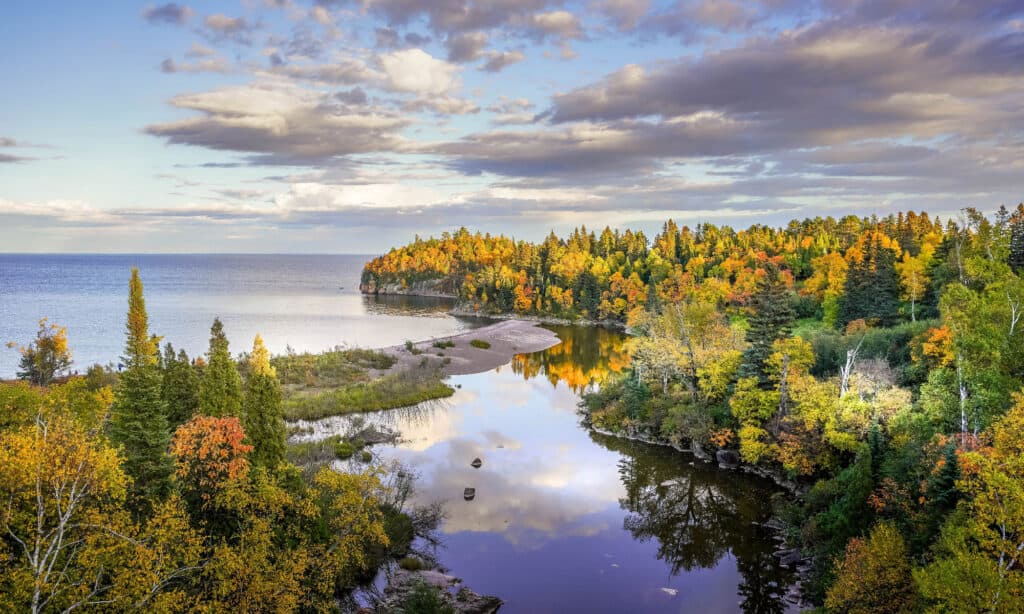
Lake Superior is the deepest of the Great Lakes.
©iStock.com/Susan Rydberg
When talking about the size of the Great Lakes, it’s hard not to be curious about just how large they are! Of the five lakes, Lake Superior is the deepest of them all. In fact, Lake Superior is the deepest, coldest, and largest by surface area and has the most shoreline of any of the Great Lakes.
On average, Lake Superior measures around 500 feet deep. For comparison, the closest average depth of the next Great Lake is Lake Ontario, at 282 feet. At the deepest measured point, Lake Superior is 1,332 feet, around a quarter-mile straight down. Again, comparing it to the next deepest point in another Great Lake, Lake Michigan comes in second with a depth of 925 feet.
Which Great Lake is the largest?
The largest Great Lake of the five lakes is unquestionably Lake Superior. Lake Superior has the deepest average depth, deepest total depth, most shoreline, most surface area, and has the coldest temperatures out of any Great Lake.
Lake Superior has an average depth of 492 feet, a single lowest depth of 1,332 feet, stretches 350 miles from west to east, has 2,800 miles of shoreline, and has 3,000 cubic miles of water volume contained within. In fact, Lake Superior has so much water that you could fill each of the other four lakes, plus Lake Erie three extra times.
What is the deepest lake in the world?
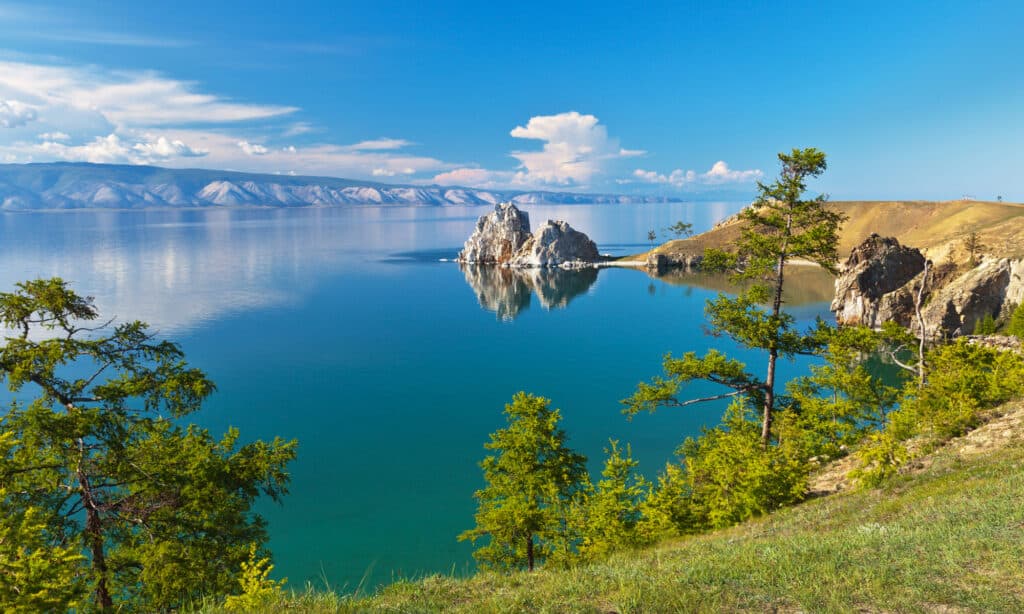
Lake Baikal is the deepest lake in the world and is located in Siberia.
©Katvic/Shutterstock.com
After looking at the stats for Lake Superior, it probably feels impossible for there to be a larger lake than Lake Superior! As it stands, Lake Superior is the largest freshwater lake in the world by surface area. Still, there are some other lakes to compare to Lake Superior in depth and volume of water.
The Caspian Sea is, well, a sea! Strangely enough, it’s also classified as a lake as it meets all of the requirements. What makes the Caspian Sea different, however, is that it’s salty, with about a third of the ocean’s salinity. Still, if you want to be “technically” accurate, the Caspian Sea is the largest lake in the world by surface area and the third deepest lake in the world.
Still, even with the Caspian Sea, there is a lake that is deeper and has more volume than any other lake in the world. Lake Baikal, located in Siberian Russia, is the deepest and largest lake by volume in the entire world. Even more, it’s been around for 25 million years, making it the oldest lake in the world as well. The deepest part of Lake Baikal measures 5,387 feet. Additionally, Lake Baikal holds over 20% of the entire world’s unfrozen surface water.
How does Lake Superior compare to the deepest lake in the world?
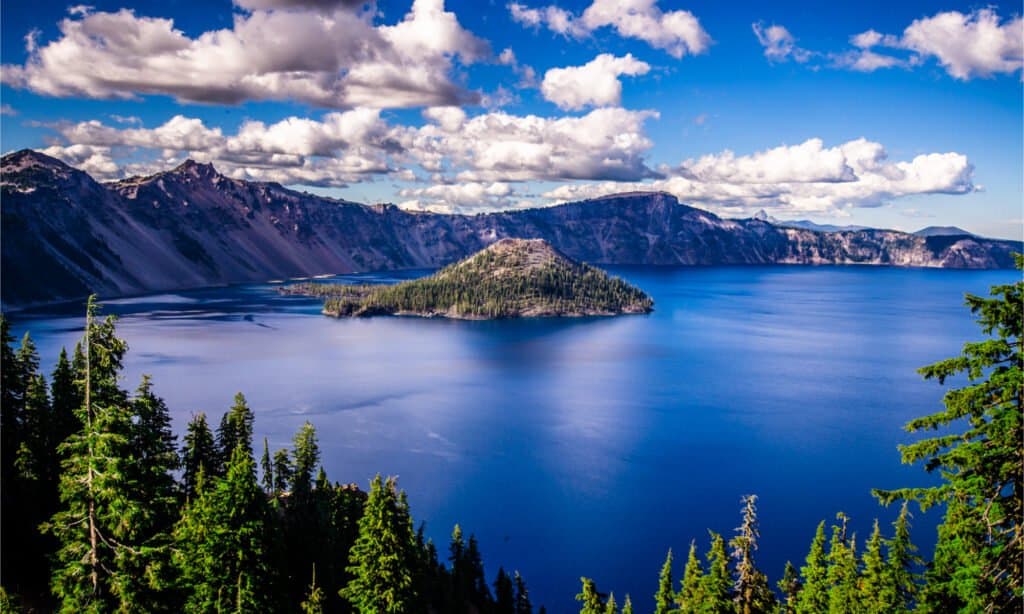
Crater lake is the deepest lake in the United States.
©Pung/Shutterstock.com
Although Lake Superior is quite deep, it isn’t the deepest lake in the world. That title falls to Lake Baikal, a large freshwater lake located in Siberia. Still, Lake Superior holds the title of the largest freshwater lake by surface area in the world.
In the United States, however, there is one lake that is actually deeper than Lake Superior, although it isn’t nearly as large. Crater Lake is located in Oregon and is, without a doubt, one of the most beautiful sights in the United States. It was formed when a volcanic eruption collapsed the mountain’s peak only 7,700 years ago. Soon after, it began filling with rain and snow and is one of the most pristine freshwater bodies on earth. Additionally, at 1,943 feet deep, it’s the deepest lake in the entire United States.
The photo featured at the top of this post is © iStock.com/Posnov
Thank you for reading! Have some feedback for us? Contact the AZ Animals editorial team.



